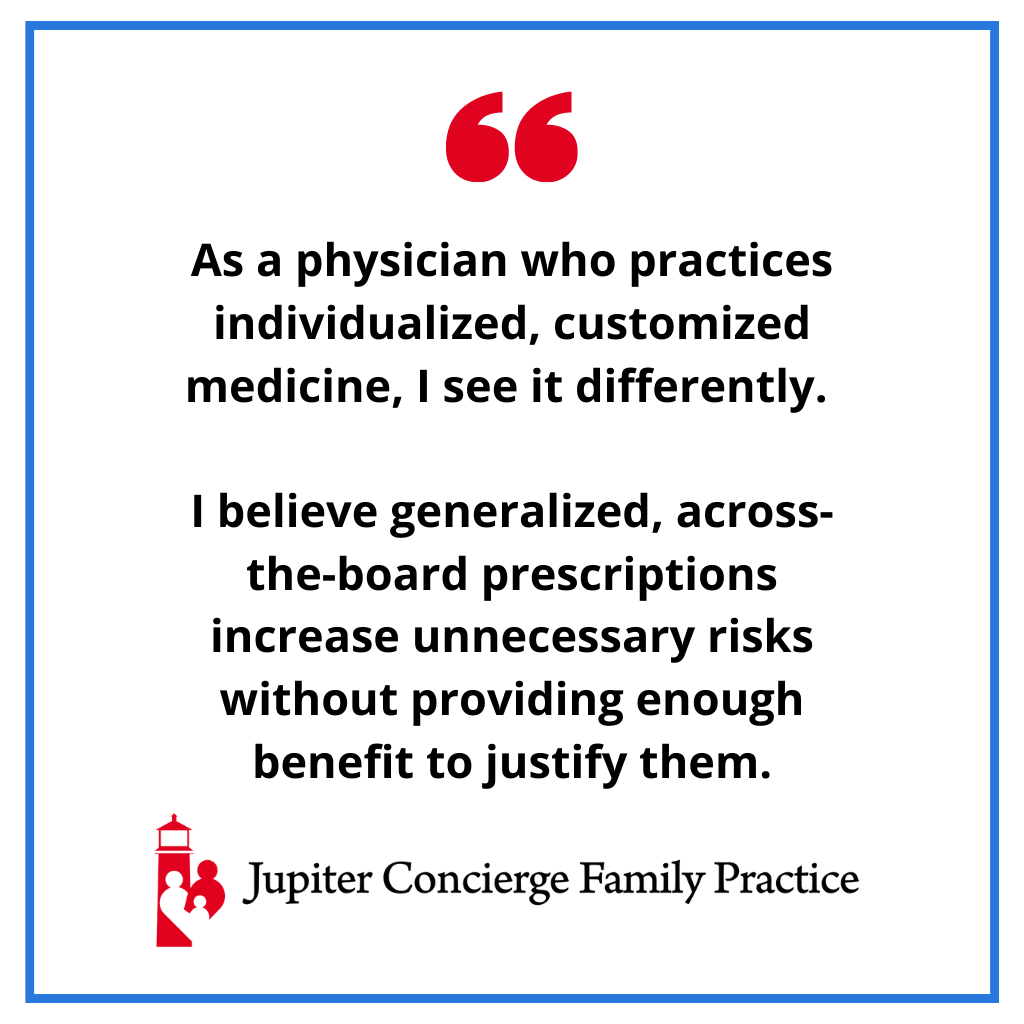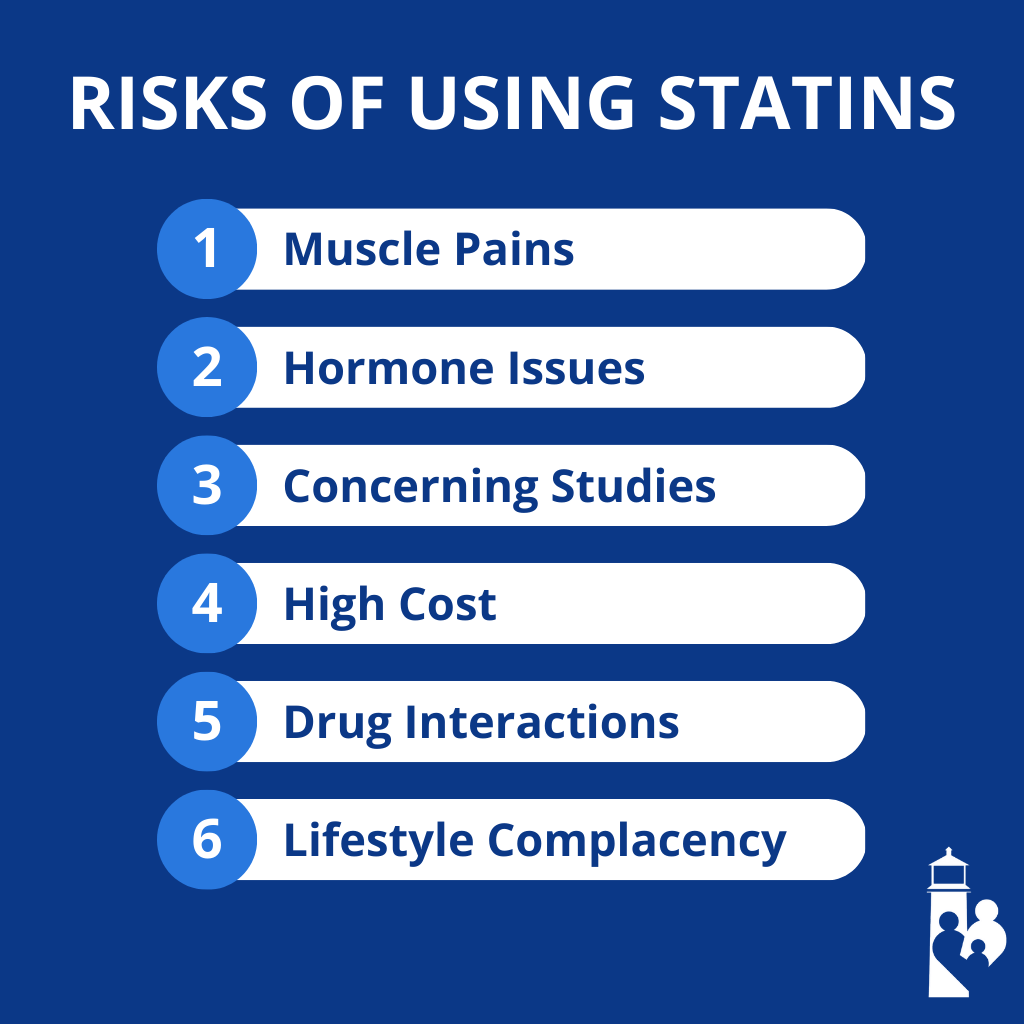
I’ve talked before about cholesterol’s importance and bad reputation. Today I want to take that conversation a little further, exploring the over-prescription of statins in the treatment of cholesterol.
Although statins can be a powerful asset, they may not be right for you. Let’s explore the case against statins.
Statins: The Whats and Whens
What are statins and when are they usually prescribed?
Statins are a group of medications that inhibit the production of low-density lipoprotein (LDL) cholesterol. For people with blocked arteries, statins stop the progression of cholesterol plaque and can reverse it.
Common statins you may have heard of include:
- Rosuvastatin (Crestor)
- Atorvastatin (Lipitor)
- Simvastatin (Zocor)
- Pravastatin (Pravacol)
- Pitavastatin (Livalo)
Because statins inhibit the production of LDL cholesterol, they’re usually prescribed in cases of high LDL. But the term “high” is relative to the person whose LDL we’re considering.
In most cases, “high” LDL is somewhere between 160 and 190. However, for people who are at high risk of developing heart disease, “high” LDL is any value over 100. And for people who already have heart disease, we want LDL levels to be less than 50 or 70.
Many cardiologists believe the benefits of being on a statin far outweigh the risks, regardless of an individual’s risk for heart disease. This leads them to prescribe it to more people, even people who are at low risk for heart disease.
As a physician who practices individualized, customized medicine, I see it differently. I believe generalized, across-the-board prescriptions increase unnecessary risks without providing enough benefit to justify them.
Here are the risks I’m talking about.
Unnecessary Statins Are Risky Business
Nothing in life is without risk. In everything we do, we assess the risks and weigh them against the potential benefits (or against the risks of not doing it).
In the case of statins, here are the risks and drawbacks worth considering:
1. Muscle Pains
Statins can cause muscle pain, which leads to complex, detrimental problems.
When pain comes into the picture, it can lower a patient’s activity level. Sometimes they’re unable to exercise as frequently as they otherwise would, and sometimes they can’t exercise at all. This, in turn, increases their risk of developing other health problems, including heart-related problems.
2. Hormone Issues
Cholesterol is a naturally occurring and absolutely essential aspect of human health. Our bodies rely upon cholesterol for proper hormone function. When LDL levels aren’t high, a statin can actually lower cholesterol too much. This hinders hormonal pathways and causes problems.
3. Concerning Studies
Some studies show statins usage is associated with a higher risk of diabetes and dementia. While the results are inconclusive, the risk should be considered. It’s another tick in the box that says “prescribe only when necessary.”
4. High Cost
Statins can be very expensive. If you’re not at risk for heart disease, why absorb an unnecessary (and recurring) expense?
5. Drug Interactions
Any new drug you take poses a risk of interacting with any drug you already take.
Statins are broken down by enzymes in the body. Sometimes those are enzymes that other medications also use — which can increase or decrease the effectiveness of those other medications.
6. Lifestyle Complacency
In addition to the risk factors we already covered, there’s also the reality that medications sometimes lull people into a false sense of security. After being prescribed a statin, people may think they can eat whatever they want with no consequences.
But the fact is statins don’t replace a healthy lifestyle. Diet and exercise are crucial components of cardiac health, regardless of whether you’re taking a statin.
How to Keep Statins Sensible
Now that we’ve reviewed the risks of unnecessary statins, let’s look at when statins are useful and helpful.
Who Should Take a Statin?
People with the following attributes should be on a statin:
- LDL over 190
- LDL over 100 with high heart disease risk (diabetes, hypertension, failed lifestyle changes to lower LDL)
- Known heart disease (research has shown people with known heart disease benefit from taking a statin regardless of their LDL value)
Who Should Avoid a Statin?
If a person has these conditions, they should avoid taking statins:
- Liver disease
- Allergic reactions to that class of medications
My Statin Recommendation
Anyone with a low risk of heart disease and an LDL under 190 should pursue lifestyle changes first, and not jump straight to using statins.
It’s better to see what changes you can make by implementing healthy eating and movement habits and then add the statin if it’s needed. Perhaps you can successfully address your heart disease risk factors through lifestyle change, and avoid statin risks altogether.
The Case Against Statins: Conclusion
Everything has risks. There is no silver bullet, or magic pill, in medicine. No one thing is without drawbacks, and no single intervention solves all problems. What we have to decide is when the benefits outweigh the risks.
There’s no question that statins provide benefits under certain circumstances, when the benefits outweigh the risks. But that doesn’t mean people should take them outside of those circumstances — when the risks may outweigh the benefits.
When it comes to statin use, talk with your physician to make sure the benefits outweigh the risks.

Dr. David Rosenberg
Dr. Rosenberg is a board-certified Family Physician who obtained a BS in Chemistry at Georgia's Mercer University in 1983 and a medical degree from the University of Miami in 1988. He completed his residency in Family Medicine at The Washington Hospital in Washington, Pennsylvania, in 1991 and then practiced Emergency Medicine at Palm Beach Gardens Medical Center for two years. In 1993 he started private practice in Jupiter.
Dr. Rosenberg has been married to his wife Mary for 38 years and they have three grown children together. Some of his interests include being a huge baseball fan, sailing, snow skiing, self-development, and learning to play piano.


